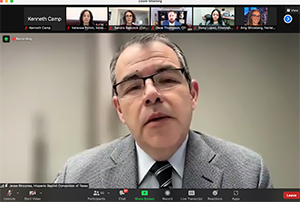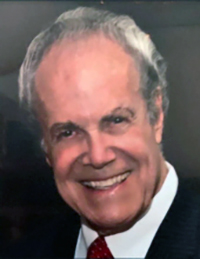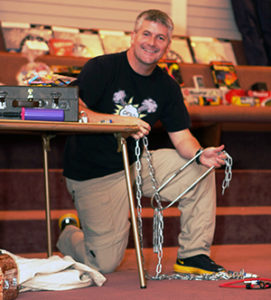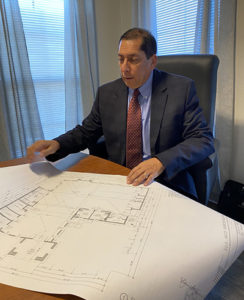Baptist pastors and leaders join clemency plea for Melissa Lucio
Dozens of Texas Baptists—including the executive director of the Hispanic Baptist Convention of Texas—are among more than 100 faith leaders requesting clemency for Melissa Lucio, who is scheduled to be executed April 27.

The faith leaders assert false and invalid evidence led to Lucio’s murder conviction in the death of her 2-year-old daughter Mariah. Lucio, 53, is one of six women on Texas’ Death Row and the only Latina woman in Texas history to receive the death sentence.
Lucio’s attorneys on March 22 submitted an application for clemency to Gov. Greg Abbott and the Texas Board of Pardons and Paroles.
The application urges Lucio’s death sentence either should be commuted to a lesser penalty or that she be given a 120-day reprieve from execution to prove her innocence.
The March 22 application offers new evidence not presented to the jury that convicted Lucio. It includes declarations of seven scientific and forensic experts who concluded false evidence misled the jury into believing the child was killed by physical abuse rather than medical complications after a fall.
The application documents that Lucio—a survivor of sexual and physical abuse—asserted her innocence more than 100 times before affirming statements presented by officers after five hours of “coercive interrogation.”
The application for clemency also includes declarations from five of the jurors who convicted Lucio, stating they now have grave concerns about evidence withheld from them and supporting relief for Lucio.
‘An appalling travesty of justice’
A letter from faith leaders representing multiple denominations is among the supporting documents submitted to Abbott and the board of pardons.
“There are numerous legal and practical reasons why the State of Texas should not carry out this unjust—and unjustified—execution. First and foremost, there is ample forensic and eyewitness evidence that Mariah’s death was an accident that resulted from a head injury she suffered in a fall—not a homicide,” the letter from faith leaders states.
The letter notes Lucio’s “entire life was marked by poverty, addiction and domestic violence,” but jurors never heard how her history of trauma shaped how she reacted during interrogation.
“Allowing Melissa’s execution to proceed despite the overwhelming doubts that shroud her conviction would be an appalling travesty of justice that serves no purpose whatsoever,” the letter from faith leaders states.
“It is not in the best interest of our state, our justice system, or the safety of our people. In accordance with the shared values of our diverse religious and faith traditions and in the name of mercy, we respectfully urge you to commute her death sentence.”
‘Violates both biblical virtues and legal principles’
Jesse Rincones, executive director of Convención and lead pastor of Alliance Church in Lubbock, spoke at a March 22 news conference in favor of the application for clemency.

Rincones said he strives to guide his congregation “toward compassion, forgiveness and justice.”
“The case of Melissa Lucio implicates all of these virtues,” he asserted.
The Lucio case “violates both biblical virtues and legal principles,” Rincones said.
He pointed out the Hebrew Scriptures set a high bar for punishment, requiring the testimony of two or three witnesses before guilt could be established.
“This case fails in that regard. Seven Fifth Circuit judges recognized that ‘the State presented no physical evidence or witness testimony’ establishing that Melissa abused Mariah or any of her children, let alone killed Mariah,” Rincones said.
Old Testament law allowed capital punishment only in cases where a life was taken intentionally and after appropriate judicial processes were followed, he added.
“As people of faith, we understand the basic biblical principle that mankind is broken by sin. That is why God removes vengeance from our hands,” Rincones said. “Consequently, broken people in a broken system will produce an unjust result.”
In addition to Rincones, other faith leaders who signed the letter to Abbott and the board of pardons include Rick McClatchy, coordinator of the Cooperative Baptist Fellowship of Texas; Jon Singletary, dean of the Diana R. Garland School of Social Work at Baylor University; Burt Burleson, chaplain at Baylor University; Robert Creech, professor at Baylor’s Truett Theological Seminary; Charles Foster Johnson, pastor of Bread Fellowship in Fort Worth and executive director of Pastors for Texas Children; and Eder Ibarra, director of missions for Rio Grande Baptist Association.
Pastors include Steve Wells at South Main Baptist Church in Houston, Ricardo Brambila at Primera Iglesia Bautista in Dallas, Michael Copeland of First Baptist Church in China Spring, George Mason of Wilshire Baptist Church in Dallas, Garrett Vickrey of Woodland Baptist Church in San Antonio and Ed Seay of First Baptist Church in Magnolia.
Disclosure: Jesse Rincones serves on the Baptist Standard board of directors.




 Paul Wayne Stripling, who served more than six decades as a Texas Baptist pastor and associational director of missions, died March 4 in Mansfield. He was 86. He was born Jan. 21, 1936, in Herrin, Ill., to Ben and Lucille Stripling. The Striplings moved to East Texas in his childhood, and he became a Christian at age 9 while his father was the pastor at First Baptist Church in Gladewater. When he was an undergraduate student at Baylor, Stripling was president of his junior class, president of the Honor Council and a member of Baylor’s Chamber of Commerce. He met Roberta Donnell in 1958 while attending Seventh and James Baptist Church, and they married at the First Baptist Church of Midland in 1960. He received his Bachelor of Arts degree at Baylor University before earning Bachelor of Divinity, Master of Theology and Doctor of Theology degrees from Southwestern Baptist Theological Seminary. He also received an honorary doctorate degree from Dallas Baptist University. His pastorates included Emmanuel Baptist Church in White Oak, First Baptist Church in Joshua, Baylor Baptist Church in Ennis, First Baptist Church of Golden Acres in Pasadena and Gaston Avenue Baptist Church in Dallas. During his 21 years as executive director of the Waco Regional Baptist Association he cultivated relationships with ministers and congregations in more than 130 Central Texas churches. After he retired, Waco Baptist Regional Association named him executive director emeritus, and the Baptist General Convention of Texas presented its Texas Baptist Legacy Award to him in 2017. Stripling served as a trustee at Hillcrest Baptist Medical Center for 17 years and was an adjunct faculty member at various times at Baylor University, Truett Theological Seminary and the University of Mary-Hardin Baylor. He also was director of the Hand-in-Hand ministry at Wilkirson-Hatch-Bailey Funeral Home, providing grief counseling to the bereaved. He wrote numerous articles for denominational publication and was the author of several books including From Me To You, based on his daily radio program at KCBI. He also wrote Turning Points in the History of Baptist Associations in Americaand contributed to other publications including Chicken Soup for the Golden Soul. The Striplings traveled extensively, leading groups groups to Israel, Italy and Germany. He also was involved in evangelistic efforts in Brazil and Mexico and taught seminary students in St. Petersburg, Russia. He is survived by his wife of 61 years, Roberta Donnell Stripling; daughter Paula Voyles Jewell and her husband Kirk; daughter Mary Nelson and her husband Alan; two sets of twin grandsons; and sister Carolyn Stripling Margraves. A celebration of life service will be held March 11 at 2 p.m. at Wilkirson-Hatch-Bailey Funeral Home in Waco. Visitation will be on March 10 from 5 p.m. to 7 p.m. , also at Wilkirson-Hatch-Bailey Funeral Home. Memorial giftss may be made to the Dr. and Mrs. Paul W. Stripling Ministry Guidance Endowed Scholarship Fund at Baylor University, One Bear Place #97050, Waco, TX 76798.
Paul Wayne Stripling, who served more than six decades as a Texas Baptist pastor and associational director of missions, died March 4 in Mansfield. He was 86. He was born Jan. 21, 1936, in Herrin, Ill., to Ben and Lucille Stripling. The Striplings moved to East Texas in his childhood, and he became a Christian at age 9 while his father was the pastor at First Baptist Church in Gladewater. When he was an undergraduate student at Baylor, Stripling was president of his junior class, president of the Honor Council and a member of Baylor’s Chamber of Commerce. He met Roberta Donnell in 1958 while attending Seventh and James Baptist Church, and they married at the First Baptist Church of Midland in 1960. He received his Bachelor of Arts degree at Baylor University before earning Bachelor of Divinity, Master of Theology and Doctor of Theology degrees from Southwestern Baptist Theological Seminary. He also received an honorary doctorate degree from Dallas Baptist University. His pastorates included Emmanuel Baptist Church in White Oak, First Baptist Church in Joshua, Baylor Baptist Church in Ennis, First Baptist Church of Golden Acres in Pasadena and Gaston Avenue Baptist Church in Dallas. During his 21 years as executive director of the Waco Regional Baptist Association he cultivated relationships with ministers and congregations in more than 130 Central Texas churches. After he retired, Waco Baptist Regional Association named him executive director emeritus, and the Baptist General Convention of Texas presented its Texas Baptist Legacy Award to him in 2017. Stripling served as a trustee at Hillcrest Baptist Medical Center for 17 years and was an adjunct faculty member at various times at Baylor University, Truett Theological Seminary and the University of Mary-Hardin Baylor. He also was director of the Hand-in-Hand ministry at Wilkirson-Hatch-Bailey Funeral Home, providing grief counseling to the bereaved. He wrote numerous articles for denominational publication and was the author of several books including From Me To You, based on his daily radio program at KCBI. He also wrote Turning Points in the History of Baptist Associations in Americaand contributed to other publications including Chicken Soup for the Golden Soul. The Striplings traveled extensively, leading groups groups to Israel, Italy and Germany. He also was involved in evangelistic efforts in Brazil and Mexico and taught seminary students in St. Petersburg, Russia. He is survived by his wife of 61 years, Roberta Donnell Stripling; daughter Paula Voyles Jewell and her husband Kirk; daughter Mary Nelson and her husband Alan; two sets of twin grandsons; and sister Carolyn Stripling Margraves. A celebration of life service will be held March 11 at 2 p.m. at Wilkirson-Hatch-Bailey Funeral Home in Waco. Visitation will be on March 10 from 5 p.m. to 7 p.m. , also at Wilkirson-Hatch-Bailey Funeral Home. Memorial giftss may be made to the Dr. and Mrs. Paul W. Stripling Ministry Guidance Endowed Scholarship Fund at Baylor University, One Bear Place #97050, Waco, TX 76798. But local religious leaders who gathered at the Global Faith Forum at Northwood Church in Keller made it clear love for their friend “Rabbi Charlie” left them no alternative but to respond during the crisis.
But local religious leaders who gathered at the Global Faith Forum at Northwood Church in Keller made it clear love for their friend “Rabbi Charlie” left them no alternative but to respond during the crisis.


 Racist ideas are “incorporated into the fabric of American Christianity” to the degree that it is difficult for many white Christian Americans to disentangle “being white from being Christian,” said Jones, author of White Too Long: The Legacy of White Supremacy in American Christianity.
Racist ideas are “incorporated into the fabric of American Christianity” to the degree that it is difficult for many white Christian Americans to disentangle “being white from being Christian,” said Jones, author of White Too Long: The Legacy of White Supremacy in American Christianity. In working on Jesus and John Wayne, Du Mez examined books on Christian masculinity. While they seldom directly addressed race, the heroes they held up as worthy of emulation were all white men—often men who demonstrated their strength by subduing nonwhite populations.
In working on Jesus and John Wayne, Du Mez examined books on Christian masculinity. While they seldom directly addressed race, the heroes they held up as worthy of emulation were all white men—often men who demonstrated their strength by subduing nonwhite populations. “The ways we use the Bible are different, and they say more about culture than the Bible,” she said. “We choose small portions of the Bible to focus on.”
“The ways we use the Bible are different, and they say more about culture than the Bible,” she said. “We choose small portions of the Bible to focus on.”